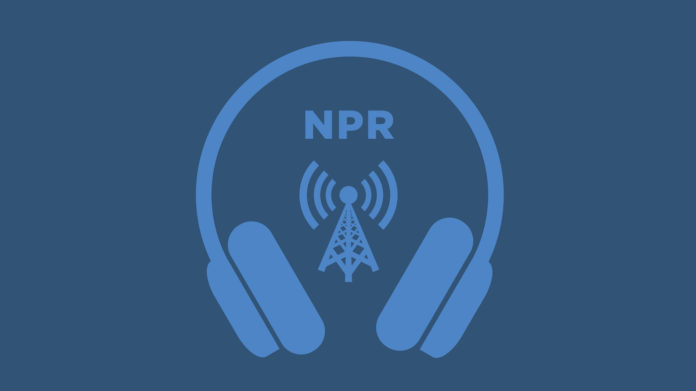
When Pride month comes, there’s always a debate about who belongs. NPR’s Sam Sanders talks with writer and commentator Roxane Gay about the arguments over who pride is for.
AILSA CHANG, HOST:
June is Pride Month, and that means lots of rainbow flags, lots of celebrations and a lot of debate over who Pride is for. Should queer police officers be able to march in uniform in Pride parades? How much should kink and fetish be on display? And are corporate sponsors welcome? NPR’s Sam Sanders has been thinking a lot about these questions and about how fights over mainstream acceptance and rebellion have played out ever since the first Pride parade in New York held 51 years ago today to commemorate the Stonewall uprising. On a recent episode of his podcast and radio show It’s Been A Minute, Sam talked it all out with writer and commentator Roxane Gay. Here’s some of their conversation.
(SOUNDBITE OF ARCHIVED NPR BROADCAST)
SAM SANDERS: You know, Pride for me, when I go now, it’s full of corporate sponsors. It’s full of straight parents bringing their kids. It feels a lot more like a block party or a parade in many cities – no longer an uprising or a riot. Does a change in experience of Pride itself also maybe change who gets to be included because it’s different now? You know what I’m saying?
ROXANE GAY: Yes and no. I mean, clearly, Pride has become something of a mass cultural celebration. And frankly, I’m ambivalent about that.
SANDERS: Tell me more.
GAY: I think that sometimes, we yearn for mainstream approval too much. And this sort of everyone’s welcome at Pride dilutes what Pride was about and who Pride is for. And we see it in a lot of the ancillary discussions about who belongs at Pride, especially when it comes to suggesting that people in kinky communities should tone it down for Pride.
SANDERS: Yeah.
GAY: I love kids.
SANDERS: Same.
GAY: And I think it’s wonderful that children attend Pride.
SANDERS: Yeah.
GAY: And I also think it’s wonderful that our children appear at Pride so that they know, like, this is who we are. This is our community. You are never going to be alone. And if straight people want to come with their families, that’s fine. But sometimes, it has the feel that they don’t even understand what they’re celebrating. They just want to be at something that’s bright and colorful and exuberant.
SANDERS: Yeah.
GAY: So I question that.
SANDERS: I also find that when we get into these arguments about, like, what should the kids that come see or not see, it feels as if it is giving the power of decision-making about what is acceptable or not to people who Pride wasn’t even originally for.
GAY: I mean, that’s exactly the problem. I mean, it seems like straight people and corporations have taken over Pride. You know, like, people now say happy Pride, which on the one hand, I am thrilled that Pride has become so embedded in our culture that it is now…
SANDERS: Yeah.
GAY: …Like, an actual sort of month-long holiday. That’s incredible. But I don’t need to see Budweiser cans, you know, like, that are colored like the rainbow and things like that.
SANDERS: Can I say, though, Roxane, I will always take the free vodka. I always will (laughter).
GAY: I mean, who wouldn’t? I mean, there’s nothing wrong with that. There is no shame in that free vodka, all right? Like, if we get swag as a side effect of having to deal with homophobia, then so be it. I’m fine with that.
SANDERS: (Laughter).
GAY: But I think that we can certainly admit that Pride has become incredibly corporatized and has become incredibly interested in heterosexual approval. And that’s getting us so far away from where we began.
SANDERS: Well, and, like, this seems to be the existential debate about the gay rights, the queer rights movement. Is it about us doing us whatever those other folks do, or is it about us becoming palatable to the mainstream?
GAY: Right.
SANDERS: I do want to go back to kink, though, because on top of this debate about whether police should be allowed to Pride or not, there’s also a debate online about whether kinksters and leather folks should be allowed at Pride. And that, for me – that seems like an even easier question to answer, and the answer is, well, of course, because they’ve always been there. But I want you to kind of talk about your thoughts on this debate and why it seems to be really hot as well this year.
GAY: I think because Pride is becoming more mainstream and people are recognizing that we’re gaining mass cultural sanction, nobody wants to threaten that. We don’t want to threaten sort of the approval that we’re currently getting. And so now a lot of queers are like, we are going to be on our best behavior by any means necessary.
SANDERS: Yeah.
GAY: And…
SANDERS: Yeah.
GAY: It’s sad. It is sad.
SANDERS: It’s tiring. It’s tiring as well.
GAY: Yeah, exactly. It’s tiring. And the idea that we should remove the sex from our sexuality is offensive. It’s almost like – a lot of times, when women talk about birth control, they’re like, oh, I’m on birth control to regulate my period. I’m like, girl, I’m on birth control ’cause I like to have sex myself.
SANDERS: (Laughter) Yeah.
GAY: I mean, I’m not speaking for myself. My birth control is flawless, and it’s called being a lesbian – or I guess bisexual. I’m married to a woman. And it works every time.
SANDERS: (Laughter) I love it.
GAY: I swear. But…
SANDERS: Yeah, I hear you.
GAY: My wife has yet to get me pregnant, though we’ve tried.
SANDERS: (Laughter).
GAY: Anyway, you know, I think we see a similar thing happening in the gay community where – like, it’s the “Will & Grace” effect, where we’re sort of cute and charming and harmless, but we don’t actually have sex. And that’s not true…
SANDERS: Yeah.
GAY: …For most of us.
SANDERS: And it’s also not historical because all of this…
GAY: No.
SANDERS: …Stonewall itself, the start of Pride itself – all of these things happened because homosexual activity was criminalized. And so if you’re now saying that at Pride, kink and leather and queer sexuality should be monitored or tamped down, you’re almost reinforcing the same kind of policing of our sexuality that was the root of the original riot.
GAY: Yes.
SANDERS: I don’t know. It just feels like when there’s this – the word normal tossed around a lot with these conversations about how much kink should be at Pride, you realize normal would never fit us in even if we faked it. You know, you realize the idea of a nuclear family itself didn’t have space for us ever from the start. And this idea that we need to now look better to the nuclear family, to the normals – it’s like, we can never do that. And, like, they know it as well.
GAY: Yeah.
SANDERS: And yet we do this song and dance around it. I don’t know.
GAY: You’re right. We do some – this song and dance around it, and it’s so frustrating. It’s so exhausting, and it’s so unnecessary because it doesn’t matter how well we dance. It’s never, ever going to be something that people – like, people who are determined to hate us are determined to hate us.
SANDERS: Yeah.
GAY: And there’s nothing we can do about that. And I think it’s so important to recognize that so that we save ourselves some heartache and some frustration and some pain. You know, like, let’s just – let’s save ourselves.
(SOUNDBITE OF MUSIC)
CHANG: That is writer and commentator Roxane Gay in conversation with Sam Sanders. You can hear more of their conversation and many other conversations about news and pop culture on the podcast It’s Been A Minute With Sam Sanders from NPR.
Copyright © 2021 NPR. All rights reserved. Visit our website terms of use and permissions pages at www.npr.org for further information.
NPR transcripts are created on a rush deadline by Verb8tm, Inc., an NPR contractor, and produced using a proprietary transcription process developed with NPR. This text may not be in its final form and may be updated or revised in the future. Accuracy and availability may vary. The authoritative record of NPR’s programming is the audio record.






